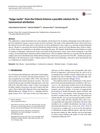 November 2023 in “ACS Omega”
November 2023 in “ACS Omega” New liposome treatment successfully delivers CRISPR to deactivate a key enzyme in androgen-related disorders.
 March 2024 in “Bioimpacts”
March 2024 in “Bioimpacts” 400 nm particles penetrate hair follicles best, but mouse models aren't fully reliable for human studies.
 5 citations,
February 2022 in “Acta Biomaterialia”
5 citations,
February 2022 in “Acta Biomaterialia” Nanomaterials can improve hair care products and treatments, including hair loss and alopecia, by enhancing stability and safety, and allowing controlled release of compounds, but their safety in cosmetics needs more understanding.
 47 citations,
April 2017 in “European Journal of Pharmaceutics and Biopharmaceutics”
47 citations,
April 2017 in “European Journal of Pharmaceutics and Biopharmaceutics” The new dutasteride formula can be applied to the skin, may promote hair growth, and has fewer side effects.
 25 citations,
June 2013 in “Obesity Reviews”
25 citations,
June 2013 in “Obesity Reviews” Mesotherapy might help reduce fat in specific areas for those close to their ideal weight, but more research and care are needed to ensure safety.
5 citations,
April 2023 in “Pharmaceuticals” The new delivery system improved hair growth in alopecia treatment.
 February 2009 in “International Journal of Dermatology”
February 2009 in “International Journal of Dermatology” New dermatology leaders and events were announced.
 September 2023 in “Frontiers in bioengineering and biotechnology”
September 2023 in “Frontiers in bioengineering and biotechnology” JAGGED1 could help regenerate tissues for bone loss and heart damage if delivered correctly.
 December 2024 in “Pharmaceutics”
December 2024 in “Pharmaceutics” Spironolactone nano-formulations show promise for treating skin disorders, but more research is needed for safety and effectiveness.
1 citations,
May 2024 in “International Journal of Molecular Sciences” Adenosine receptors could be promising targets for treating inflammatory skin diseases like psoriasis.
 1 citations,
December 2013 in “Turkderm”
1 citations,
December 2013 in “Turkderm” Use of cosmeceuticals during pregnancy and breastfeeding is not recommended due to insufficient safety data.
 9 citations,
November 2022 in “Applied sciences”
9 citations,
November 2022 in “Applied sciences” Marine algae compounds may improve skin health and promote hair growth.
 7 citations,
December 2021 in “Pharmaceutics”
7 citations,
December 2021 in “Pharmaceutics” Natural products like plant extracts can help promote hair growth and could be used to treat hair loss.
 4 citations,
September 2018 in “Rendiconti lincei. Scienze fisiche e naturali”
4 citations,
September 2018 in “Rendiconti lincei. Scienze fisiche e naturali” Researchers concluded that "spigo nardo" is the Himalayan plant Nardostachys jatamansi, used historically in medicine and cosmetics, now critically endangered.
 13 citations,
September 2012 in “Critical Reviews in Food Science and Nutrition”
13 citations,
September 2012 in “Critical Reviews in Food Science and Nutrition” Wheat straw is valuable for its health benefits and various industrial uses.
 January 2021 in “Journal of cosmetology & trichology”
January 2021 in “Journal of cosmetology & trichology” The treatment improved hair growth and thickness in patients with hair loss, even 10 months after therapy without additional products.
 93 citations,
April 2012 in “International Journal of Cosmetic Science”
93 citations,
April 2012 in “International Journal of Cosmetic Science” Improving skin barrier and using antifungal treatments can help manage dandruff.
 60 citations,
January 2014 in “Anais Brasileiros De Dermatologia”
60 citations,
January 2014 in “Anais Brasileiros De Dermatologia” Nanotechnology in dermatology shows promise for better drug delivery and treatment effectiveness but requires more safety research.
83 citations,
August 2020 in “Resources” Macroalgae compounds offer sustainable, effective benefits for cosmetics.
 21 citations,
October 2014 in “Actas dermo-sifiliográficas/Actas dermo-sifiliográficas”
21 citations,
October 2014 in “Actas dermo-sifiliográficas/Actas dermo-sifiliográficas” Hair dyes can change hair color temporarily or permanently but may cause side effects like skin reactions and hair damage.
August 2022 in “International journal of membrane science and technology” Finasteride diffuses spontaneously through SDS micelles, suggesting they can replace living cell membranes.
 January 2025 in “Organics”
January 2025 in “Organics” Micelles can change cetirizine's ionization, affecting its effectiveness in treatments.
38 citations,
September 2017 in “Journal of zoo and wildlife medicine” Oclacitinib maleate successfully treated alopecia in Andean bears.
50 citations,
December 2017 in “Nanoscale” Polymeric micelle nanocarriers deliver adapalene more effectively to hair follicles than commercial products.
 4 citations,
January 1994 in “Yakugaku zasshi”
4 citations,
January 1994 in “Yakugaku zasshi” EPC-K is stable except at very acidic pH or when exposed to sunlight, and it can decompose in low ethanol concentrations.
159 citations,
July 2014 in “Molecular pharmaceutics” New micelle nanocarriers deliver Tacrolimus more effectively to skin layers for psoriasis treatment than the current Protopic ointment.
 59 citations,
January 2015 in “Nanoscale”
59 citations,
January 2015 in “Nanoscale” The new micelle formulation delivers acne treatment more effectively and safely than current gels.
 4 citations,
March 2023 in “Journal of controlled release”
4 citations,
March 2023 in “Journal of controlled release” A special gel with medicine helps prevent melanoma from coming back after surgery.
 2 citations,
November 2019 in “Phytotherapy Research”
2 citations,
November 2019 in “Phytotherapy Research” Pea sprout extract is safe and effectively reduces hair loss.
 November 2024 in “EMJ Dermatology”
November 2024 in “EMJ Dermatology” A new topical treatment using SAMiRNA technology shows promise in increasing hair growth for androgenetic alopecia.






















